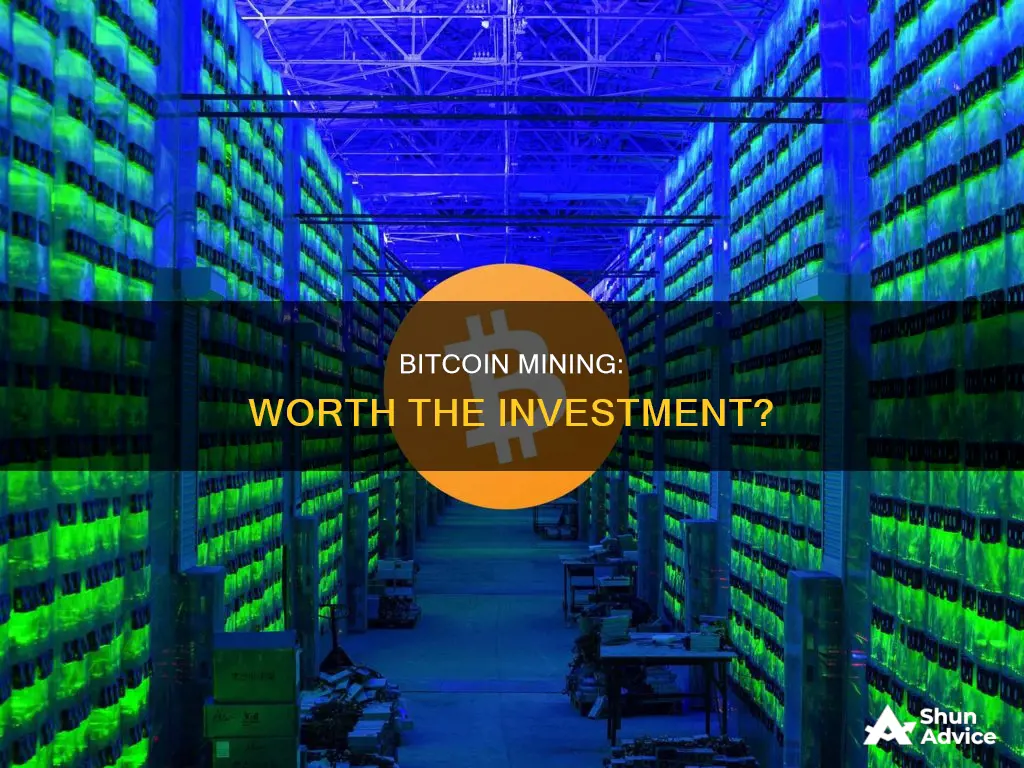
Bitcoin mining can be profitable, but it is difficult for small miners to make a profit. The cost of equipment and electricity, as well as the mining difficulty and bitcoin's market value, all impact the profitability of bitcoin mining.
Bitcoin mining is a process in which miners earn bitcoins in exchange for running the verification process to validate Bitcoin transactions. While it is still possible to make money through bitcoin mining, it is not as lucrative as it once was due to the increasing number of people and organisations engaged in the activity.
Prospective miners should consider factors such as set-up costs, electricity costs, efficiency, bitcoin price, and pool payout schemes before deciding to mine. Additionally, the degree of speculation in the market and the potential for high electricity costs should also be considered when determining whether to invest in bitcoin mining.
| Characteristics | Values |
|---|---|
| Profitability | Money can be made, but no method guarantees profit |
| Mining Difficulty | Difficulty scales with the number of miners in the network |
| Electricity Costs | The cost of electricity to power the mining machines can be high |
| Speed of Miner | The more computing power a machine has, the more bitcoin you will mine |
| Cost of Miner | A mining machine costs $2,000-$20,000 |
| Taxes | Taxes on mining profits must be paid |
| Mining Pools | Joining a mining pool comes with a fee, reducing profits |
What You'll Learn

Is it profitable to mine Bitcoin?
Bitcoin mining can be profitable, but it depends on a lot of factors. Firstly, it is important to note that the more miners there are, the more difficult it is to mine Bitcoin. This is because the Bitcoin network adjusts the difficulty of the cryptographic puzzle that needs to be solved in order to mine a Bitcoin block. This puzzle is so complex that it cannot be solved by a human, and instead requires specialist hardware.
The more miners there are, the more computing power there is to solve the puzzle, and so the Bitcoin network increases the difficulty of the puzzle to ensure that, on average, it takes 10 minutes to solve. This means that, as more miners join the network, an individual miner's computing power makes up a smaller and smaller proportion of the total network computing power. This makes it harder for that miner to solve the puzzle and earn the block reward.
There are three main ways to mine Bitcoin: solo mining, pool mining, and cloud mining. Solo mining involves using your own Bitcoin mining equipment, and you get to keep 100% of the rewards. However, you are also responsible for all of the costs, which can be very high. To have a chance of competing with other miners, you will need to invest in expensive, powerful hardware, and cover the significant energy costs of running this hardware 24/7.
Pool mining involves joining a group of other miners and combining your hashing power. This increases your chance of solving a block and earning a reward, but any reward you earn will be shared with the other miners in the pool. Most mining pools also charge fees, which further eat into your profits.
Cloud mining is the most budget-friendly way to mine Bitcoin. This involves purchasing hashing power from an established mining farm. You don't need to buy any hardware, and you don't have to pay huge energy bills, but you do have to pay fees, and there is no guarantee that you will make a profit.
Other factors that determine the profitability of Bitcoin mining include the price of Bitcoin, the cost of electricity in your country, the efficiency of your hardware, and any taxes you may have to pay on your mining rewards.
In summary, it is possible to make money through Bitcoin mining, but it is difficult, costly, and unpredictable.
Investing in Bitcoin: Is It Worth Putting $1000 in Crypto?
You may want to see also

How much does it cost to mine 1 Bitcoin?
The cost to mine 1 Bitcoin varies depending on several factors, including electricity costs, hardware costs, and the price of Bitcoin.
According to JPMorgan strategists, the production cost to mine 1 Bitcoin has dropped from $24,000 at the start of June to $13,000. However, other sources suggest that the cost to mine 1 Bitcoin in the US is higher, ranging from $17,000 to over $100,000 in certain states. The wide range in costs is due to varying electricity rates and hardware setups.
To mine 1 Bitcoin, one must consider the upfront investment in mining equipment, known as ASICs (application-specific integrated circuits), which can cost thousands of dollars. Additionally, the energy consumption required to run these machines is significant, impacting electricity costs. Other costs to consider include infrastructure, hardware maintenance, and hiring employees to maintain mining farms.
The profitability of mining 1 Bitcoin depends on the market price of Bitcoin. When the price of Bitcoin is high, profits increase, as mining rewards are paid in BTC tokens. However, when the price is low, profit margins decrease.
It's important to note that mining 1 Bitcoin is a complex and competitive process, often referred to as an "arms race," as those with the most powerful devices have the best chance of success. Therefore, it is challenging to provide an exact cost for mining 1 Bitcoin, as it depends on various factors and the specific setup of the miner.
Mining Bitcoin: Free, Fast, and Easy?
You may want to see also

What are the pros and cons of mining Bitcoin?
Pros of Mining Bitcoin:
- You have full control and authority over your money.
- It helps to overcome the evils of counterfeiting money as it lies in the digital space.
- The fees to process transactions are much more affordable compared to traditional banks.
- The push and pull method used to keep your identity secure leaves no room for hackers to tamper with your information.
- If you land a deal, its processing is much faster as it does not involve any third party.
- It has become a legitimate industry supported by dedicated professionals with specialised hardware.
- It is the most effective blockchain consensus mechanism in terms of cybersecurity.
- It is more focused on clean energy sources than almost all other large-scale industries in the world.
Cons of Mining Bitcoin:
- It requires high computational and technical skills.
- It can be costly to set up and run the mining equipment, especially if you are an individual miner.
- It is difficult for small miners to make a profit due to the increasing difficulty level of Bitcoin mining and the number of large institutional players in the Bitcoin mining ecosystem.
- It uses a lot of energy for mining, along with hardware expenses.
- The cryptocurrency market is volatile and constantly fluctuating, so there is a risk of losing money.
Millions Invested in Bitcoin: Who and How Many?
You may want to see also

How do you mine Bitcoin?
Bitcoin mining is the process of creating new bitcoins by solving extremely complicated math problems that verify transactions in the currency. When a bitcoin is successfully mined, the miner receives a predetermined amount of bitcoin.
Bitcoin mining requires substantial hardware and software. Miners need a graphics processing unit (GPU) or an application-specific integrated circuit (ASIC). The computer hardware required is known as application-specific integrated circuits, or ASICs, and can cost up to $10,000.
To mine Bitcoin, you need to:
- Get a wallet. This is where any Bitcoin you earn as a result of your mining efforts will be stored. A wallet is an encrypted online account that allows you to store, transfer and accept Bitcoin or other cryptocurrencies.
- Get mining software. There are a number of different providers of mining software, many of which are free to download and can run on Windows and Mac computers.
- Get computer equipment. You'll need a powerful computer that uses an enormous amount of electricity to successfully mine Bitcoin. It’s not uncommon for the hardware costs to run around $10,000 or more.
Bitcoin mining is a complex process. When a transaction is made between wallets, the addresses and amount are entered into a block on the blockchain. The block is assigned some information, and all of the data in the block is put through a cryptographic algorithm (called hashing). The result of hashing is a 64-digit hexadecimal number, or hash.
Miners are guessing a number that is lower than the target hash. The target hash is a hexadecimal number set to require an average number of attempts.
Miners make these guesses by adjusting the nonce, which is part of the information being hashed. Nonce is short for "number only used once", and it is the key to generating these 64-bit hexadecimal numbers. Due to size limitations, the block field the nonce is stored in only allows for a number of up to about 4.5 billion; it must be rolled over using another counter because generating 4.5 billion hashes takes less than one second.
The mining program sends block information with a zero as the first nonce through the hashing function. If that number is wrong, the nonce is increased by a value of one, and the hash is generated again. This continues until a hash that is less than the target hash is generated.
The first miner to find the solution to the problem receives bitcoins as a reward, and the process begins again. This reward is an incentive that motivates miners to assist in the primary purpose of mining: to earn the right to record transactions on the blockchain for the network to verify and confirm.
The Next Big Thing: What's Outpacing Bitcoin?
You may want to see also

Is it better to buy Bitcoin or mine it?
Whether it is better to buy Bitcoin or mine it depends on a variety of factors, including access to cheap electricity, efficient hardware, and a good mining pool.
Mining Bitcoin
Mining Bitcoin can be a lucrative endeavour, but it comes with several challenges and risks. Here are some key considerations:
- Equipment Costs: Mining Bitcoin requires specialized hardware, such as ASIC (Application-Specific Integrated Circuits) miners, which can cost anywhere from a few hundred to several thousand dollars.
- Electricity Costs: Mining consumes a significant amount of electricity, and high power rates can significantly impact profitability. It is crucial to consider electricity costs when deciding whether to mine Bitcoin.
- Competition: The difficulty of mining Bitcoin has increased over time due to the growing number of miners and the increasing computing power required to solve the puzzles. This competition makes it harder for smaller miners to compete and achieve profitability.
- Risk: Mining Bitcoin carries risks, including the potential for equipment damage due to continuous operation at maximum performance. Additionally, the future of mining is uncertain, and it is expected to become more challenging as more people join the mining effort.
- Taxes: Profits from mining are taxable, and it is important for miners to be aware of the relevant tax laws in their area.
- Pool Fees: Most miners join mining pools to increase their chances of earning rewards. However, these pools typically charge fees that reduce the overall profits.
Buying Bitcoin
Buying Bitcoin is a more straightforward approach and may be more suitable for those who do not have the resources or expertise to mine. Here are some key considerations:
- Simpler and More Accessible: Buying Bitcoin on an exchange is generally simpler and more accessible than mining. It does not require specialized hardware or knowledge of mining processes.
- Risk: Buying Bitcoin also carries risk, as the market for cryptocurrencies is volatile and subject to significant price fluctuations. However, the risk of losing money due to equipment damage or obsolescence is lower compared to mining.
- Taxes: Similar to mining, profits from buying and selling Bitcoin are subject to taxes. It is important to consider the tax implications and consult with a tax professional to ensure compliance.
In conclusion, both mining and buying Bitcoin have their advantages and disadvantages. Mining can be profitable if one has access to cheap electricity, efficient hardware, and a good mining pool. However, it is a complex and risky endeavour that may not be suitable for everyone. Buying Bitcoin, on the other hand, is simpler and more accessible but carries the risk of market volatility. Ultimately, the decision to mine or buy Bitcoin depends on individual circumstances, risk tolerance, and access to resources.
A Beginner's Guide to Investing in Bitcoin Cash in India
You may want to see also
Frequently asked questions
It depends on several factors, including equipment and electricity costs, mining difficulty, and Bitcoin's market value. While it can be profitable, it is becoming more challenging for small miners to compete with large-scale mining operations.
The cost of investing in Bitcoin mining can vary depending on the type of equipment used. A basic mining rig can cost around $3,000, while some miners spend more than $10,000 on their setups. Additionally, there are electricity costs associated with running the mining equipment, which can be significant.
The amount of money that can be made from Bitcoin mining depends on various factors, including the price of Bitcoin, the hash rate, and the difficulty of mining. On average, a Bitcoin mining machine can generate around $12 in Bitcoin revenue per day, but this can vary.
Investing in Bitcoin mining carries several risks, including the volatility of the cryptocurrency market, the high energy consumption and associated costs, and the potential for equipment to become outdated or obsolete. Additionally, there is the risk of hacking and theft of Bitcoin, as well as the regulatory and tax implications of mining.
To get started with Bitcoin mining, you will need to acquire specialized hardware, such as ASIC miners or GPU rigs. You will also need to join a mining pool, which allows miners to combine their resources and increase their chances of earning rewards. Additionally, you will need to set up a Bitcoin wallet to store your earnings.







